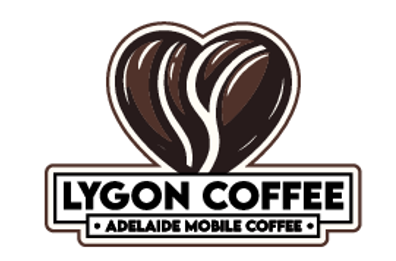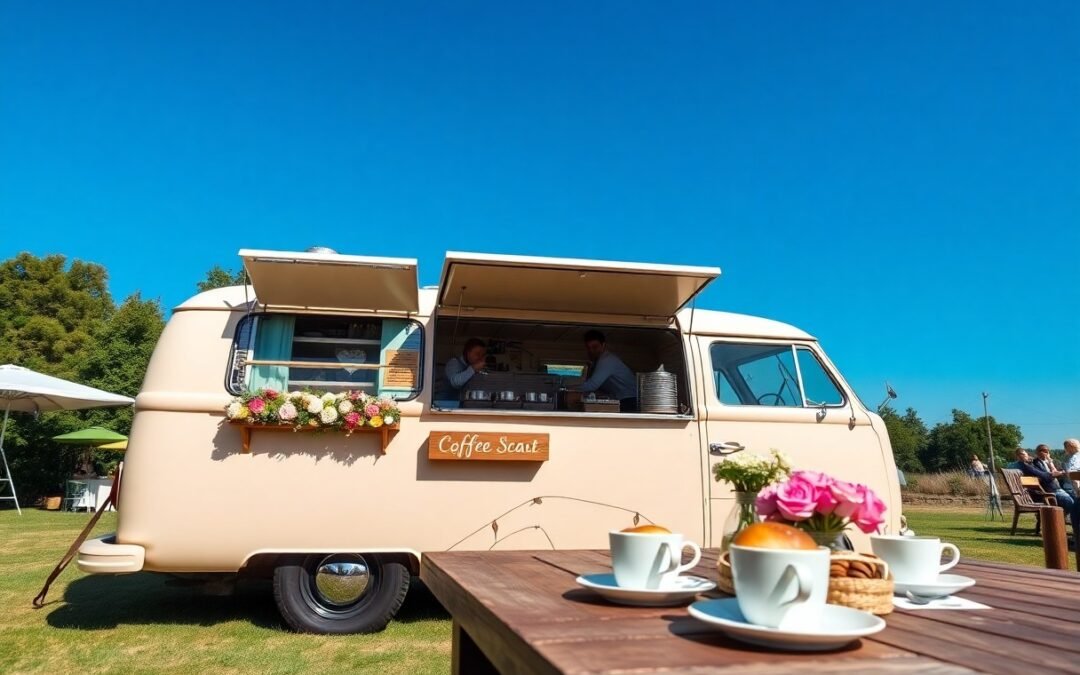Ultimate convenience and festivity await you when hiring a coffee van for your wedding or party. This guide will help you navigate the key considerations, from selecting the perfect vendor to understanding menu options, ensuring your event serves delightful brews that keep your guests energized and satisfied. With the right insights, you can elevate your celebration and create a memorable experience for everyone involved.
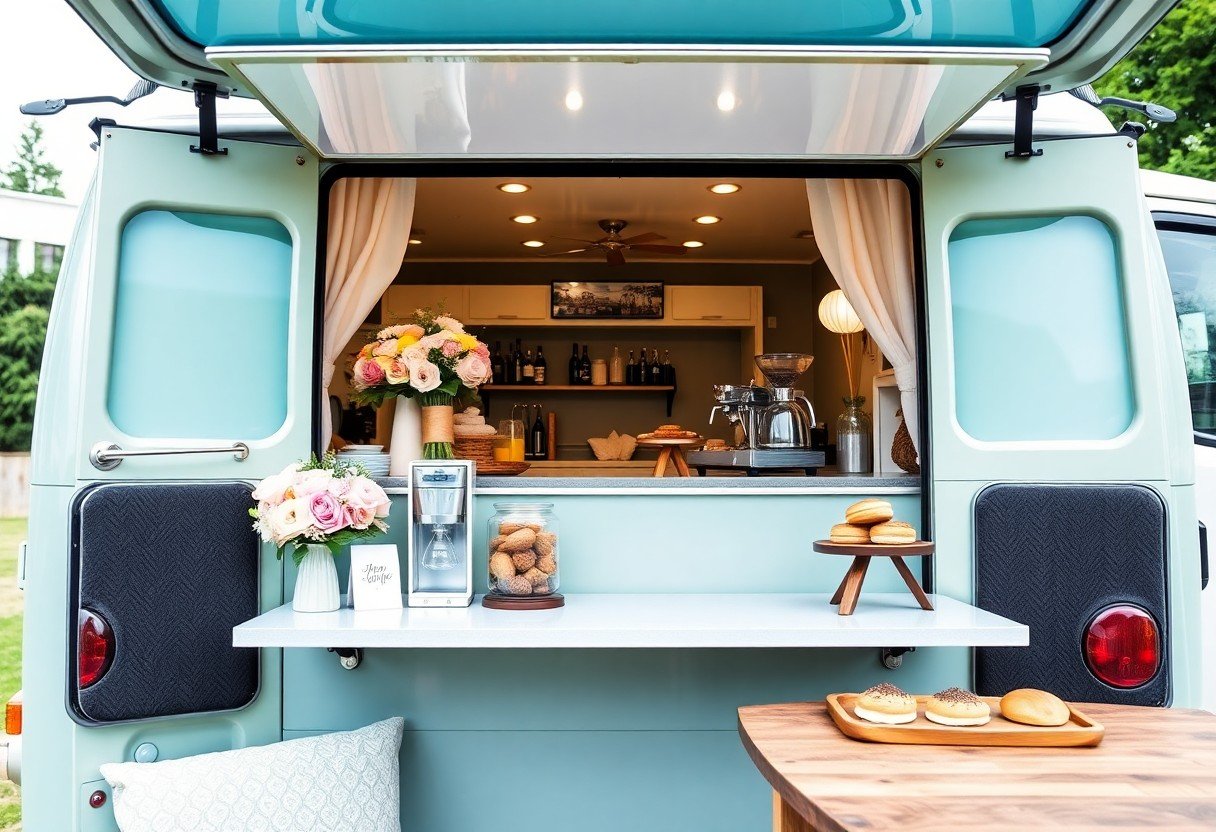
Unlocking the Perfect Coffee Van Experience
Key Elements of a Memorable Coffee Service
Your coffee service should not only provide exceptional beverages but also create an inviting atmosphere that encourages social interaction. Consider the layout of the coffee van; it should be positioned in a way that allows guests easy access while also facilitating a flow of movement. Engaging baristas who can interact with guests while crafting drinks adds a personal touch that elevates the experience. For added visual appeal, incorporating themed decorations or signage that matches your event’s aesthetic helps to create a cohesive look that resonates with attendees.
Customization Options for Unique Events
Your event’s theme or style can shine through with tailored coffee experiences. Collaborating with the coffee van provider allows you to create a signature drink that reflects the essence of your occasion. This could range from a special flavor combination that resonates with the couple’s love story to bespoke latte art featuring your logo or initials. Unique offerings not only tantalize the palate but also become talking points that guests remember long after the day concludes.
With customization, opportunities are plentiful. Discussing options such as seasonal syrups, various milk alternatives, or even creating a coffee cocktail bar can add excitement. Any unique element you choose will not only enhance the experience but also contribute to the overall narrative of your event, ensuring it stands out in your guests’ memories.
Navigating Your Budget: Cost Factors Explained
Understanding the costs associated with hiring a coffee van is imperative for aligning your vision with your budget. Various factors contribute to the overall price, including the type of van, duration of service, and special requests like custom menus or premium coffee beans. Any additional offerings, such as pastries or special equipment, can also increase your costs. Common cost components include:
- Base rental fee
- Hourly service rate
- Ingredients and supplies
- Travel and setup expenses
- Staffing costs
Knowing these factors empowers you to make informed decisions while planning your event.
Pricing Structures: Hourly Rates vs. Packages
Coffee vans typically operate on two pricing structures: hourly rates and packaged deals. Hourly rates give you flexibility, allowing you to hire the van for specific durations based on your event timeline. This option usually covers basic service and ingredients, making it suitable for smaller events where precise timing is imperative. Packages, on the other hand, often include a set number of beverages, snacks, and sometimes even additional services like equipment rental for a fixed price. These can be advantageous for larger gatherings where a comprehensive offering maximizes convenience.
Selecting the right structure depends on your event’s scale and coffee service needs. Hourly rates might save you money if you expect short service times, whereas packages could streamline costs for extensive events.
Hidden Costs and Considerations
Even after calculating the apparent expenses, hidden costs can pop up in unexpected places. Factors such as travel distance, setup time, and any required permits may add to the final bill. Additionally, keep in mind that not all vans include gratuity in their prices, which might necessitate budgeting an extra 15–20% for the staff. Also, consider potential overtime fees if your event runs longer than planned, along with cancellation policies that could impose penalties for last-minute changes.
A thorough review of the contract and discussions with your chosen vendor helps identify these hidden costs beforehand. Knowing the full scope of expenses ensures that you can allocate your budget effectively without unwelcome surprises.
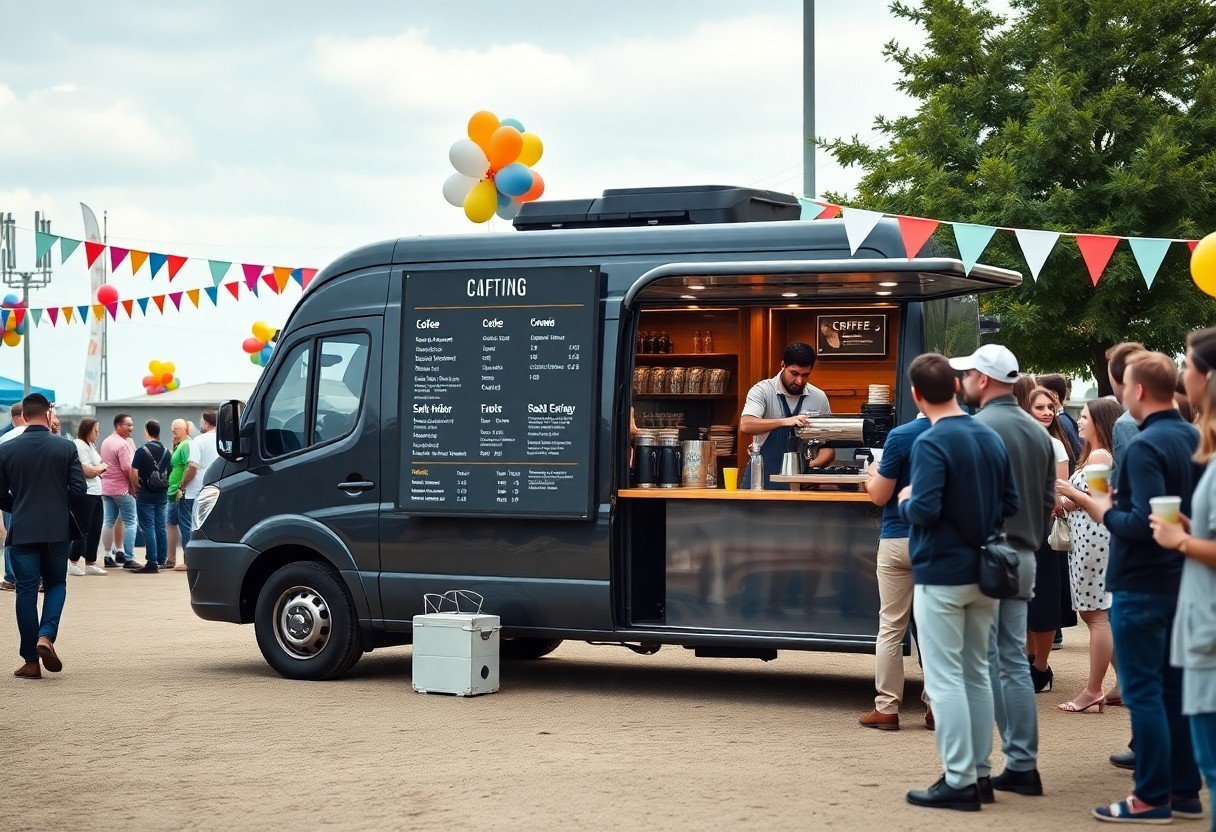
Finding Your Dream Coffee Van: The Search Process
Researching Local Vendors
Start by exploring local coffee van options through a combination of online research and word-of-mouth recommendations. Websites like Yelp, Google Reviews, and social media platforms can offer insights into customer experiences and the overall quality of the service each vendor provides. You may also discover niche coffee vans that specialize in particular styles or beans, enhancing the uniqueness of your event.
Visiting local farmers’ markets or coffee festivals can connect you with mobile vendors and allow you to sample their offerings firsthand. Take note of not just the coffee quality, but also the customer service and presentation. Positive interactions at these events can be a telling sign of how well the vendor will perform at your wedding or party.
Questions to Ask During Initial Consultations
Before making a final decision, you’ll want to gather specific information from potential vendors. Start by asking about their menu options, customization opportunities, and whether they can accommodate dietary restrictions such as vegan or gluten-free choices. Additionally, inquire about their experience with events similar to yours and how they handle peak service times when guest demand is high.
Understanding pricing structures is vital; some vendors offer packages based on the number of guests, while others might have à la carte pricing. Clarifying what is included in their service—like equipment, staff, cups, and transport fees—helps avoid surprises later. This knowledge will not only help you evaluate your options but also ensure that your chosen coffee van aligns with your budget and vision.
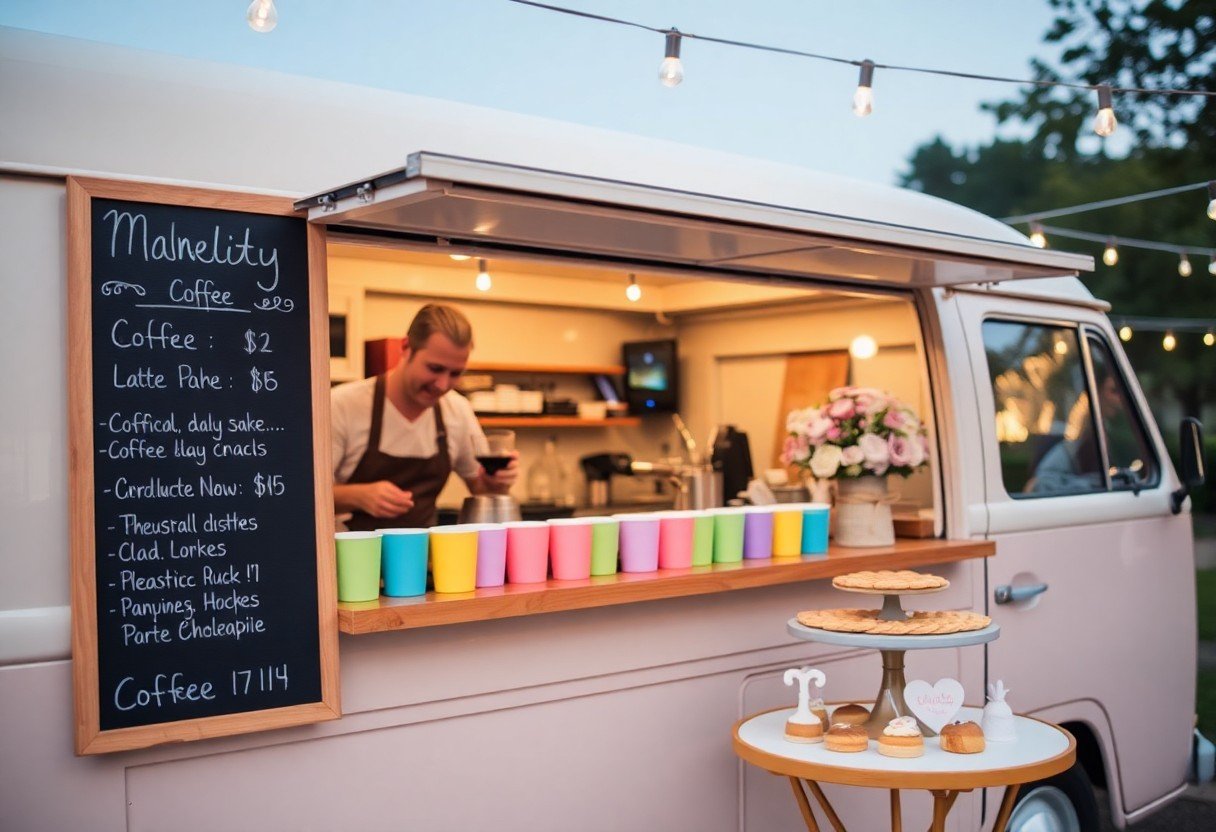
Crafting the Ideal Coffee Menu: Tailoring for Taste
Popular Beverage Choices for Weddings and Parties
Your coffee menu can significantly enhance the wedding or party experience, offering a selection that resonates with your guests’ preferences. Classic favorites like espresso, cappuccino, and lattes provide a solid foundation. Consider adding unique twists, such as flavored syrups (vanilla, caramel, or hazelnut) and seasonal specials like pumpkin spice lattes or peppermint mochas during the winter months. A cold brew option can be refreshing for summer events, while specialty iced coffees cater to warm-weather festivities.
Highlighting local roasters can add a personal touch, showcasing the region’s unique flavor profiles. Providing an option for organic or fair-trade coffee not only supports sustainable practices but also appeals to environmentally-conscious guests. Offering a selection of dairy and non-dairy milk options, such as almond, oat, or soy, ensures that everyone can find something to suit their taste.
Dietary Considerations and Specialty Options
Accommodating guests’ dietary needs enhances their overall experience and shows consideration for individual preferences. Offering decaffeinated coffee options ensures that caffeine-sensitive individuals feel included. Alcohol-infused coffees, like Irish coffee or espresso martinis, can add an exciting twist, providing a fun alternative for adult gatherings.
Additionally, integrating sugar-free syrups and natural sweeteners like stevia allows guests to personalize their drinks without compromising dietary choices. Consider including a selection of herbal teas or hot chocolate for those who prefer non-coffee options, ensuring that everyone can enjoy a warm beverage during the event.
Ultimately, crafting a diverse and appealing coffee menu not only enhances the atmosphere but also allows you to cater to various palates and dietary restrictions, making your event more inclusive and enjoyable for all attendees.
Ensuring Smooth Operations on the Big Day
Setup Logistics and Event Timelines
Begin by coordinating closely with the coffee van vendor to establish a clear timeline for setup. Typically, a coffee van should arrive at least 1-2 hours before the event starts, allowing enough time for parking, setup, and any necessary equipment checks. This lead time is necessary, especially if the venue has restrictions regarding vehicle movement or access to power sources. You may want to prepare a detailed timeline that outlines key moments such as guest arrivals, the start of service, and any scheduled breaks.
Incorporate specific logistics into your plan by designating a suitable location for the coffee van. Ensure there is enough space for the van to operate without obstructing other activities or causing congestion. Additionally, have designated personnel or volunteers available to assist the vendor with guiding them to the setup area and managing guest flow during peak times. This proactive approach will help keep everything running seamlessly on the day of your event.
How to Prepare Your Venue for a Coffee Van
Preparing your venue ahead of time will greatly enhance the efficiency of service from the coffee van. Start by assessing the layout of your space and identifying where the coffee van will be positioned. Ideally, select a location that is both accessible for guests and allows the vendor to operate without hindrance. Consider proximity to power sources if the van requires electricity for equipment. Ensure that your venue permits any necessary permits for food and beverage services, as local regulations may apply.
Think about guest flow and traffic patterns, ensuring that lines for coffee do not interfere with other event activities. If your venue is outdoors, plan for weather contingencies, such as providing shade or cover to protect guests and equipment from rain or sun exposure. If you’re anticipating a large turnout, it might be beneficial to create a pre-ordering system or encourage guests to come during certain time slots, further easing any potential crowding around the coffee station.
To wrap up
Ultimately, hiring a coffee van for your wedding or party can transform your event into a memorable experience for you and your guests. By carefully considering your options and aligning them with your preferences, you can ensure that the coffee service complements your theme and adds a special touch. From understanding the logistics to choosing the right vendor, each step is important in making your decision. Don’t forget to explore Why a Coffee Cart Is LA’s Best-Kept Party Secret in 2025 for more insights.
Your event deserves the best, and a coffee van can provide not only delicious beverages but also a unique experience that engages your guests. With an array of options available, you can customize the experience to suit your needs, ensuring that each cup served is a perfect reflection of your celebration. By prioritizing quality and service, you can create lasting memories that go beyond the ordinary.
FAQ
Q: What are the benefits of hiring a coffee van for events?
A: Hiring a coffee van provides freshly brewed drinks, unique experiences, and tailored menus that cater to guests’ preferences. It also adds a special atmosphere and can enhance the overall theme of the event.
Q: How do I choose the right coffee van for my wedding or party?
A: Consider factors such as the vendor’s experience, menu options, and reviews from previous events. It’s also important to check if they have the necessary equipment and staff to handle your guest count efficiently.
Q: What types of beverages can a coffee van typically offer?
A: Most coffee vans offer a variety of options, including espresso, cappuccino, lattes, iced coffee, teas, and sometimes specialty drinks. Some may also provide non-coffee alternatives like hot chocolate or fresh juices.
Q: How much does it cost to hire a coffee van for an event?
A: Costs can vary based on factors such as location, duration of service, and menu selections. Generally, prices range from $500 to $2,500, so it’s advisable to get quotes from multiple vendors.
Q: Do coffee vans require any special permits or licenses for events?
A: Yes, coffee vans typically need to have the appropriate food service permits and licenses, which can vary by location. It’s important to verify that the vendor meets all local health and safety regulations.
